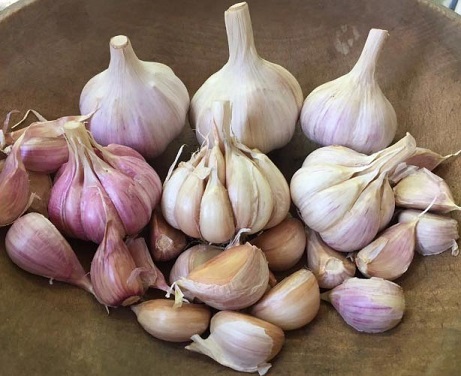Australian peer reviewed study shows that the extracts of certain garlic cultivars can inhibit COVID-19
Nikhil Prasad Fact checked by:Thailand Medical News Team Aug 11, 2024 1 year, 5 months, 3 weeks, 2 days, 18 hours, 32 minutes ago
COVID-19 News: Study Reveals Garlic's Antiviral Effects Against SARS-CoV-2 Are Cultivar Specific
Researchers from the University of Melbourne's Department of Microbiology and Immunology, based at the Peter Doherty Institute for Infection and Immunity, in collaboration with Australian Garlic Producers, have uncovered intriguing findings about garlic's potential to inhibit SARS-CoV-2, the virus responsible for COVID-19. This
COVID-19 News report dives into their comprehensive study that explored the antiviral properties of garlic oil and juice extracts, revealing that these effects are highly dependent on the specific garlic cultivar used.
 Extracts of certain garlic cultivars can inhibit COVID-19
Garlic’s Long History as a Natural Remedy
Extracts of certain garlic cultivars can inhibit COVID-19
Garlic’s Long History as a Natural Remedy
Garlic has been celebrated for centuries, not only as a flavorful ingredient in culinary dishes but also for its purported medicinal properties. Known scientifically as Allium sativum, garlic has been traditionally used to combat a variety of ailments, thanks to its antimicrobial and antiviral properties. The global COVID-19 pandemic, which has claimed millions of lives, led to renewed interest in natural remedies, including garlic, as potential aids in reducing susceptibility to SARS-CoV-2.
The Study's Objective: Testing Garlic's Antiviral Properties
The study conducted by the Australian research team in collaboration with Australian Garlic Producers, aimed to determine whether garlic extracts could effectively inhibit the SARS-CoV-2 virus. They tested over 20 different garlic cultivars, extracting both oil and juice from each variety to assess their ability to prevent the virus from infecting cells.
Key Findings: Not All Garlic is Created Equal
The research team discovered that out of more than 20 garlic cultivars tested, only one garlic oil extract and one juice extract exhibited significant antiviral properties against SARS-CoV-2. Interestingly, these effective extracts were from different garlic cultivars, indicating that the antiviral properties are not universal across all garlic varieties.
The garlic oil extract that showed strong inhibition was identified as AGO56200. This oil extract was able to reduce the infectious virus titer significantly, preventing the virus from successfully infecting host cells. Similarly, a juice extract from a different garlic cultivar, labeled as AGJ31175, not only limited the infection but also appeared to destroy the viral genome, rendering the virus inactive.
How Does Garlic Inhibit the Virus?
The study revealed that the garlic oil's ability to inhibit the virus might be due to its emulsion effect, which prevents the virus from attaching to and penetrating the host cells. However, it was noted that the interaction with the virus did not degrade the viral genome, meaning that the virus could potentially be rescued under certain conditions. On the other hand, the juice extract from the AGJ31175 cultivar demonstrated a more aggressive
action by disrupting the viral genome itself, suggesting a different mechanism of action.
The Importance of Cultivar Specificity
One of the most crucial findings of the study is that the antiviral properties of garlic are highly dependent on the specific cultivar used. This discovery challenges the common assumption that all garlic has equal medicinal properties. The researchers emphasized the need for caution when using garlic or its extracts as a herbal remedy, as not all varieties are effective against SARS-CoV-2.
Implications for Garlic as a Natural Antiviral Agent
The study’s findings hold significant implications for the use of garlic as a natural antiviral agent. The fact that only specific garlic cultivars demonstrated antiviral activity suggests that consumers and manufacturers should be selective about the type of garlic used in supplements or other medicinal preparations.
Moreover, the study highlights the potential for developing targeted garlic-based antiviral treatments. If the active components in the effective garlic varieties can be identified and isolated, they could be used to create more effective natural antiviral therapies. This could be particularly valuable in the ongoing fight against COVID-19 and other viral infections.
Challenges and Future Research Directions
While the study provides promising insights, it also opens the door to several questions and challenges. For instance, it remains unclear why only certain garlic cultivars exhibit antiviral properties. Further research is needed to explore the specific compounds in these garlic varieties that are responsible for the antiviral effects.
Additionally, there is a need to investigate whether the effectiveness of these garlic extracts can be replicated in clinical settings. The study was done in vitro, meaning that the results were observed in a controlled laboratory environment. More research is needed to determine if these findings will hold true in human trials.
Conclusion: Caution and Potential
The study findings offer a nuanced understanding of garlic’s potential as an antiviral agent against SARS-CoV-2. It underscores the importance of cultivar specificity, as not all garlic varieties possess the same medicinal properties. This article sheds light on the potential of garlic in natural medicine but also calls for caution, emphasizing that more research is needed before garlic can be recommended as a reliable antiviral treatment.
The findings were published in the peer-reviewed Journal of Functional Foods.
https://www.sciencedirect.com/science/article/pii/S1756464624003955
For the latest
COVID-19 News, keep on logging to Thailand Medical News.
Read Also:
https://www.thailandmedical.news/news/herbs-and-phytochemicals-saponins-from-chinese-garlic-attenuates-endothelial-inflammation-and-acute-lung-injury-via-nf-kb-vcam-1-pathway
https://www.thailandmedical.news/news/shictin-a-novel-lectin-from-shiitake-mushrooms-shows-promise-in-combating-covid-19-omicron-variant
